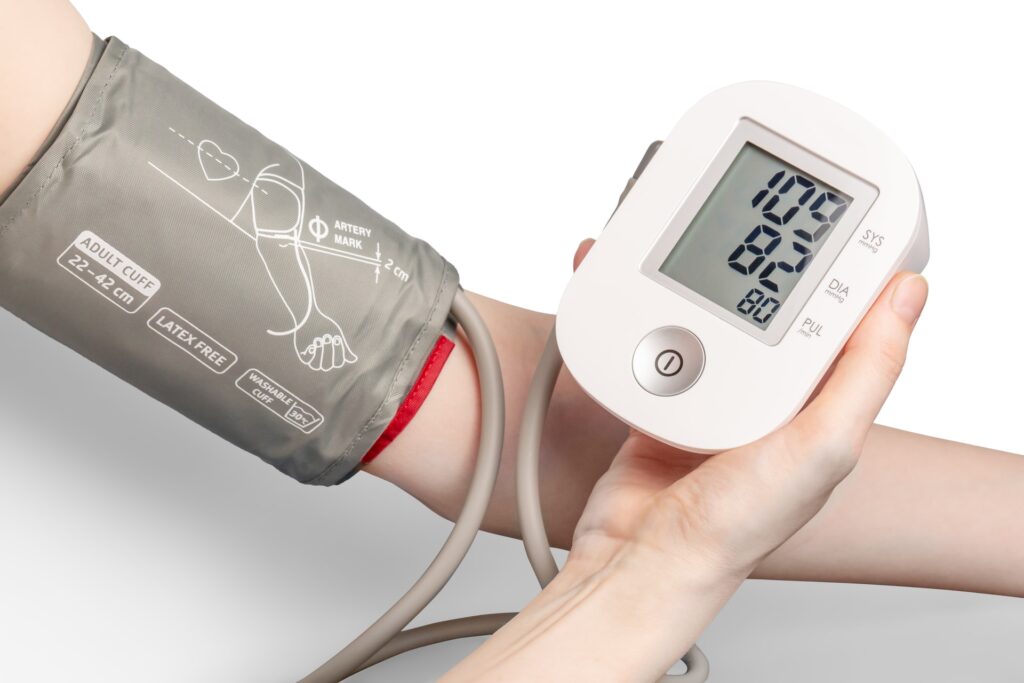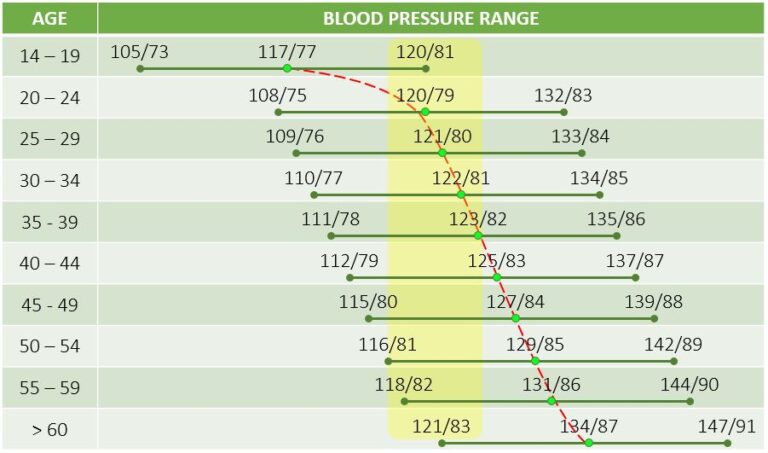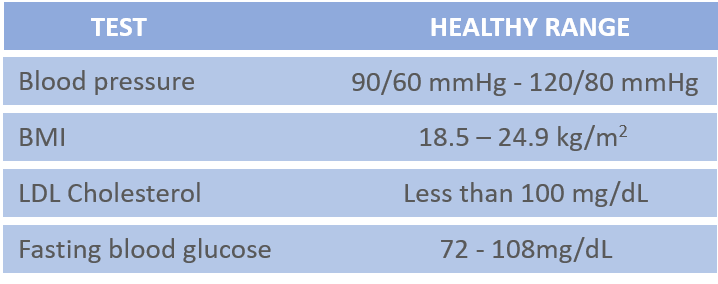Page Contents
Hypertension also known as high blood pressure, it is a chronic medical condition in which the heart is pounding stronger to supply oxygen and nutrient to whole body, but blood vessels are narrow because of blockage or increased viscosity in blood leading to persistently elevated blood pressure.

Statistics and trends
Hypertension is a common condition in Singapore. Approximately 25% of Singapore residents aged 30 to 69 years suffer this condition. As you age, the chances of getting hypertension increases. Between the age of 60 – 69 years, more than half of the population is diagnosed with hypertension.
Progression from healthy to hypertension
There are two directions of where blood pressure could progress, to a lower range where it is known as HYPO-tension, and to a higher range, also known as HYPER-tension. For hypertension, the condition progresses from Elevated to Stage 1 to Stage 2 (Figure 1).
- Healthy – When blood pressure is between 90/60 mmHg and 120/80 mmHg, you are in the normal range.
- Elevated – Systolic between 120 and 129 mmHg and diastolic less than 80 mmHg.
- Stage 1 – Systolic between 130 and 139 mmHg and diastolic 80 and 89 mmHg.
- Stage 2 – Systolic higher than 140 mmHg and diastolic higher than 90 mmHg.

Blood pressure and age
You may think that 120/80 mmHg is the healthy blood pressure for everyone, that is not entirely true. Well, 120/80 falls within the acceptable range from 14 and above. For age group 14 – 19, it is at the high end, while for people age 60 and above, it is actually at the lower end (Figure 2).
Your blood pressure increases as you age because of various factors, including stiffness of arteries, blockage by cholesterol, weak heart, inefficiency of blood circulation, weak kidneys, etc.
Aside from age groups, blood pressure also varies for different genders, typically male has higher blood pressure than female.

2 types of hypertension
Primary hypertension
This type of high blood pressure develops gradually over many years as part of ageing process where functions of the major body organ deteriorate.
Secondary hypertension
This type of high blood pressure is caused by an onset of underlying condition, including:
- Obstructive sleep apnoea
- Kidney problems
- Adrenal gland tumours
- Thyroid problems
- Congenital defects in blood vessels
- Medications such as birth control pills, cold remedies, decongestants, over-the-counter pain relievers and some prescription drugs
- Illegal drugs such as cocaine and amphetamines
What causes hypertension?
Most of the time, the cause of hypertension is unknown. However, some factors are correlated with high blood pressure:
- Diet high in salt
- Diet high in fat and/or cholesterol
- Chronic conditions such as kidney disease, hormone imbalance, diabetes, and narrowing of blood vessels (arteriosclerosis)
- Family history (if your parents or other close relatives have same conditions)
Are you at risk?
Hypertension has many risk factors, that include:
- Age. The chances of getting hypertension increases as you age.
- Family history. You have a higher chance if your parents or other close relatives have high blood pressure.
- Obesity. The more you weigh, the more blood you need to supply oxygen and nutrients to your tissues. As the volume of blood circulated through your blood vessels increases, so does the pressure on your artery walls.
- Sedentary. People who are inactive have weaker heart. Weaker heart means it needs to pump more to circulate the blood to whole body. The higher your heart rate, the harder your heart work with each contraction, the stronger the force on your arteries.
- Smoking. The chemicals in tobacco can damage the lining of your artery walls. This can cause your arteries to narrow and increase your risk of heart disease.
- Dehydration. When you are chronically dehydrated, your brain will signal the pituitary gland to secrete vasopressin that causes constriction of the blood vessels. This will increase your blood pressure.
- High salt diet. Too much sodium in your diet can cause your body to retain fluid, which increases blood pressure.
- Low potassium diet. Potassium helps to balance the amount of sodium in your cells. If you don’t get enough potassium in your diet or retain enough potassium, you may accumulate too much sodium in your blood.
- Alcohol. Heavy drinking can increase the risk of hypertension and damage your heart in the long run.
- Stress. High levels of stress can lead to a temporary increase in blood pressure.
- Certain chronic conditions. Certain chronic conditions, such as kidney disease, diabetes and sleep apnoea can also lead to hypertension.
What are the symptoms?
Hypertension is one of the silent killers. Even when you are in a severe stage, it may not give rise to any symptoms. Occasionally, you may have headaches, giddiness, shortness of breath, nosebleed, etc., but these symptoms are not specific to hypertension, they are also present in other conditions.
Very often, if you are not monitoring your blood pressure regularly, hypertension may only be discovered when there are other complications, such as stroke or heart attack.
Is hypertension curable?
When you are diagnosed with hypertension, your doctor will prescribe anti-hypertensive medications to regulate your blood pressure and keep it under control. As this is a lifelong medication, it is important that you follow the prescription strictly without discontinuing or reducing the dosage on your own. Also, regular monitoring and record keeping are essential.
How is hypertension treated?
The common anti-hypertensive medications belong to these 5 main groups:
- Diuretics
- Beta-blockers
- Calcium channel blockers
- Angiotensin converting enzyme inhibitors
- Angiotensin II receptor blockers
What may come next?
Long-term high blood pressure without proper medication control could lead to:
- Coronary artery disease
- Stroke
- Heart failure
- Atrial fibrillation
- Peripheral arterial disease (narrowing of the blood vessels of the limbs)
- Atherosclerosis (hardening and thickening of the arteries)
- Aneurysm (formation of bulges in blood vessels)
- Vision loss
- Chronic kidney disease
- Metabolic syndrome (increased waist circumference, high triglycerides, low HDL cholesterol, high blood pressure and high insulin levels)
- Dementia
- Difficulty in understanding and remembering
All of these are related to the weakening of heart and excessive pressure that damages the blood vessels in any part of your body.
Living with hypertension
If you have been diagnosed with hypertension and prescribed with medications, there are 4 things that you need to keep an eye on:
- Remember to take your medications as prescribed. Do not stop intermittently or change the dosage at will.
- Perform blood pressure monitoring daily to monitor the trend and keep a record, if possible, do note that there are moments that are not suitable for measuring, e.g., immediately after waking up, after meal, after exercise, and lying down. I will share more detail in future article.
- Be aware of any persistent symptoms, such as headache, numbness, blurred vision, forgetfulness. These may be an early sign of other complications.
- Go for annual health check-up to identify potential signs and symptoms of health conditions
What to do if there is still time?
If you do not have hypertension now, start living a healthy lifestyle with the following:
- Healthy and balanced diet (less salt, less oil, less sugar)
- Exercise regularly to keep your heart working and joints moving
- Stay calm and mindful to manage your emotion and stress
- Quit smoking and limit alcohol intake
- Go for yearly or bi-yearly health check up and make sure you meet the healthy range (Figure 3)

Sometimes, you may have higher blood pressure reading when you measure at clinics or hospitals. This may be caused by ‘white coat syndrome’, it is often a phobia (iatrophobia) or anxiety that surrounds doctors and hospital settings. If you suspect you are in this situation, try getting a blood pressure monitor from a local pharmacy store and measure it at home.
